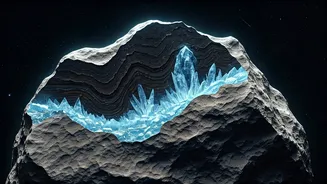Asteroid Exploration's Yield
The Hayabusa2 mission, a Japanese space probe, was responsible for collecting the samples from the Ryugu asteroid. These samples have been a source of
significant findings, with scientists from various institutions meticulously analyzing the material. The primary goal of the mission was to study the composition of the asteroid, aiming to understand the building blocks of the solar system. The samples, containing valuable clues, have provided fresh perspectives on the formation and evolution of celestial bodies. The Hayabusa2 project has undeniably enhanced our comprehension of the early solar system. This exploration has yielded significant findings that challenge previous assumptions about the distribution of water and its role in planetary formation. The meticulous examination of the Ryugu samples has truly marked a milestone in space exploration and scientific discovery, and is sure to continue to do so.
Water's Billion-Year History
The presence of water within the Ryugu samples indicates that water flow occurred on the asteroid billions of years ago. The discovery of this ancient water offers insight into the geological history of the asteroid. Scientists have determined that this water was present within the rock formations of the asteroid. The precise dating of this water flow indicates that it aligns with the formation of the solar system itself. The research provides a timeline for understanding the processes that have shaped the asteroid and its environment. These findings offer valuable details on the potential for water on other celestial bodies and its significance in supporting the conditions for life beyond Earth. The research suggests that asteroids can serve as reservoirs of water, contributing to the development of planets and supporting potential life-sustaining environments.
Implications for the Cosmos
The discovery of billion-year-old water in Ryugu has broad implications for our understanding of the universe. It suggests that water, a key ingredient for life, may have been widely distributed throughout the early solar system. This discovery has led to reassessments of the potential for life beyond Earth. The research findings support the theory that water, along with other essential elements, could have been delivered to our planet through asteroids. This scientific evidence could change our perspective on the origins of water on Earth. Furthermore, the findings from the Ryugu asteroid have stimulated discussions about the possibility of life on other celestial bodies. Further analysis of the samples is expected to unveil more information about the composition, evolution, and potential for extraterrestrial life within our vast cosmos, which could change our understanding of the universe.















